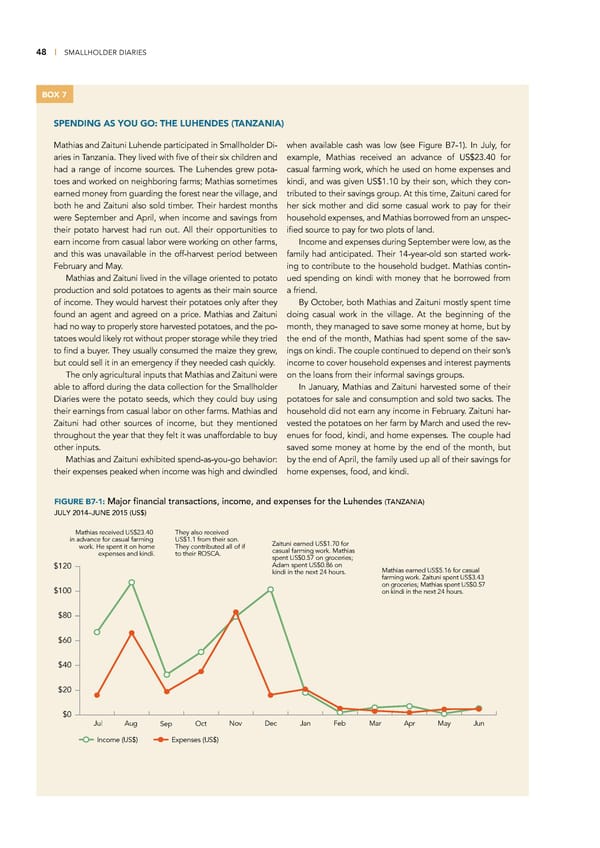48 | SMALLHOLDER DIARIES BOX 7 SPENDING AS YOU GO: THE LUHENDES (TANZANIA) Mathias and Zaituni Luhende participated in Smallholder Di- when available cash was low (see Figure B7-1). In July, for aries in Tanzania. They lived with five of their six children and example, Mathias received an advance of US$23.40 for had a range of income sources. The Luhendes grew pota- casual farming work, which he used on home expenses and toes and worked on neighboring farms; Mathias sometimes kindi, and was given US$1.10 by their son, which they con- earned money from guarding the forest near the village, and tributed to their savings group. At this time, Zaituni cared for both he and Zaituni also sold timber. Their hardest months her sick mother and did some casual work to pay for their were September and April, when income and savings from household expenses, and Mathias borrowed from an unspec- their potato harvest had run out. All their opportunities to ified source to pay for two plots of land. earn income from casual labor were working on other farms, Income and expenses during September were low, as the and this was unavailable in the off-harvest period between family had anticipated. Their 14-year-old son started work- February and May. ing to contribute to the household budget. Mathias contin- Mathias and Zaituni lived in the village oriented to potato ued spending on kindi with money that he borrowed from production and sold potatoes to agents as their main source a friend. of income. They would harvest their potatoes only after they By October, both Mathias and Zaituni mostly spent time found an agent and agreed on a price. Mathias and Zaituni doing casual work in the village. At the beginning of the had no way to properly store harvested potatoes, and the po- month, they managed to save some money at home, but by tatoes would likely rot without proper storage while they tried the end of the month, Mathias had spent some of the sav- to find a buyer. They usually consumed the maize they grew, ings on kindi. The couple continued to depend on their son’s but could sell it in an emergency if they needed cash quickly. income to cover household expenses and interest payments The only agricultural inputs that Mathias and Zaituni were on the loans from their informal savings groups. able to afford during the data collection for the Smallholder In January, Mathias and Zaituni harvested some of their Diaries were the potato seeds, which they could buy using potatoes for sale and consumption and sold two sacks. The their earnings from casual labor on other farms. Mathias and household did not earn any income in February. Zaituni har- Zaituni had other sources of income, but they mentioned vested the potatoes on her farm by March and used the rev- throughout the year that they felt it was unaffordable to buy enues for food, kindi, and home expenses. The couple had other inputs. saved some money at home by the end of the month, but Mathias and Zaituni exhibited spend-as-you-go behavior: by the end of April, the family used up all of their savings for their expenses peaked when income was high and dwindled home expenses, food, and kindi. FIGURE B7-1: Major financial transactions, income, and expenses for the Luhendes (TANZANIA) JULY 2014–JUNE 2015 (US$) Mathias received US$23.40 They also received in advance for casual farming US$1.1 from their son. Zaituni earned US$1.70 for work. He spent it on home They contributed all of if casual farming work. Mathias expenses and kindi. to their ROSCA. spent US$0.57 on groceries; $120 Adam spent US$0.86 on Mathias earned US$5.16 for casual kindi in the next 24 hours. farming work. Zaituni spent US$3.43 $100 on groceries; Mathias spent US$0.57 on kindi in the next 24 hours. $80 $60 $40 $20 $0 JulAug Sep Oct Nov Dec Jan FebMar Apr MayJun Income (US$) Expenses (US$)
 Financial Diaries with Smallholder Families Page 62 Page 64
Financial Diaries with Smallholder Families Page 62 Page 64